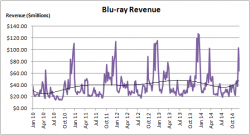Going for a really short one this week, since I’ve just come back from a full day out and for some reason, this WNR remains unwritten (probably because I’ve not written it).
![]()
So The Pirate Bay remains down, perhaps forever. If it stays down, then it will something that rights holders have wanted for a very long time. Or is it? According to the latest piracy stats, piracy remains eerily steady following TPB closure, with a small drop, and then almost back to where it was immediately.
There may be many reasons why closing the world’s biggest piracy website seems to have had no effect on piracy. The fact that there are many other major torrent sites, like isoHunt and KickassTorrents, still operating normally may have something to do with it. The numerous TPB mirror sites that have been set up since its (temporary?) demise, including one opened by isoHunt (which itself is a re-launch of the shuttered original isoHunt), have also helped to keep torrent traffic high.
And even if the piracy rate drops, there’s no guarantee this will actually lead to any noticeable financial benefits for rights holders. I mean, that’s the point of anti-piracy, right?
——
A couple of quick story roundups. Remember the DRM protected coffee pod? The DRM has been broken, and anyone can do it with scissors and sticky tape. Apparently, the DRM only consists of a special ink placed on official pods, with the machine featuring an ink reader to authenticate the pods. Cut out the part with the ink from a used official pod, secure it over the ink reader with tape, and now all unofficial third-party pods will work. Doesn’t really get any easier than this, does it?
The next couple of stories are all related to the Sony Pictures hack (what isn’t, these days). We start with leaked information showing the MPAA’s plans to destroy the Internet’s naming back bone, the DNS (Domain Name System). DNS works because every other DNS mirror in the world shares and distributes the same set of data, essentially. The MPAA however wants certain ISPs to start messing around with DNS filtering, which could lead some DNS servers having vastly different data than others, thus breaking how the naming system syncs and refreshes itself all around the world.
This is all part of the MPAA’s plans to revive hugely controversial parts of SOPA, not by legislation, but through other means. These other means are explained by Google in a new blog post, where the search giant (who recently ended all cooperation with the MPAA, again due to information gleamed from the leaked data) accused the MPAA of heading a witch hunt, which included lobbying state attorneys general and building legal cases, against the company.
This particular feud could get nasty.
![]()
I finally took the time to summarise recent Blu-ray sales for my annual(ish) Blu-ray: The State of Play feature, and I was quite surprised at how poorly Blu-ray has done over the last year and a bit. While declining DVD sales are expected, for Blu-ray revenue to decline, that’s infinitely more worrying for the good old physical disc (2014 total sales so far, with a couple of more weeks left, are down 5.8%, or around $115 million. Now, the final couple of weeks for any year (stats for which will be available by the middle of January) are always the biggest, and it isn’t inconceivable that these few weeks will help Blu-ray sales prevent a year-on-year decline, but 2013’s final few weeks were also big (record breaking, in fact).
Even if Blu-ray sales can make a recovery in the last few weeks of 2014, there’s one stat that doesn’t lie. Of the 49 weeks that have been tabulated so far, only 17 of these had a Blu-ray revenue figure that was higher than the same week in 2013. This is the exact opposite situation to last year (for the first 49 weeks), where only 17 weeks recorded a lower revenue figure than the same week from the year before (and the year before had the exact same breakdown).
A poorer new release slate, fewer “first time on Blu-ray” catalog title releases and the rise of digital could all be responsible, but if this is a trend (and it’s a big ‘if’), then this could be the beginning of the end for physical media as we know it.
![]()
While Blu-ray is down, the Xbox One is up, at least for November. It appears the stats collected by shopping insights firm Infoscout were right: the Xbox One won Black Friday, and November, not only in the US and also in the UK.
The win comes after aggressive pricing by Microsoft, with discounts starting at $50 and up to $150 for bundles. And this is all after Microsoft dropped the Xbox One bundle price by $100 earlier in the year to match the PS4’s price, when they removed Kinect and changed it to an “accessory” status (as opposed to a mandatory add-on).
It seems that if Microsoft want to get back into the game, keeping the Xbox One cheaper than the PS4 is the way to go. With that said, Sony hasn’t been sitting idle either, with the PS4 getting some fairly aggressive price cuts for the holidays too. All of this is great for gamers of course.
——
That’s it for this slightly abridged version of the WNR. See you next week (maybe, assuming there are stories to cover, which isn’t always true given it’s Christmas and all), and Merry Christmas.





